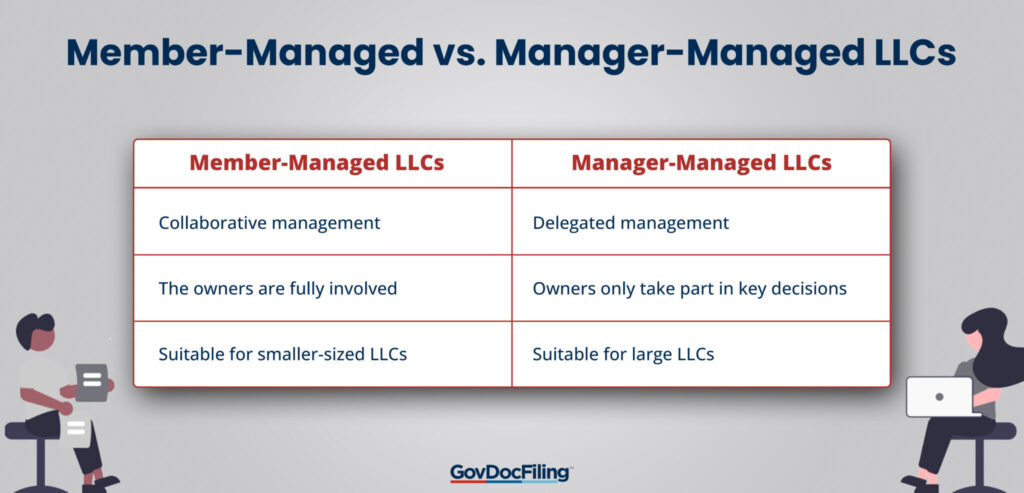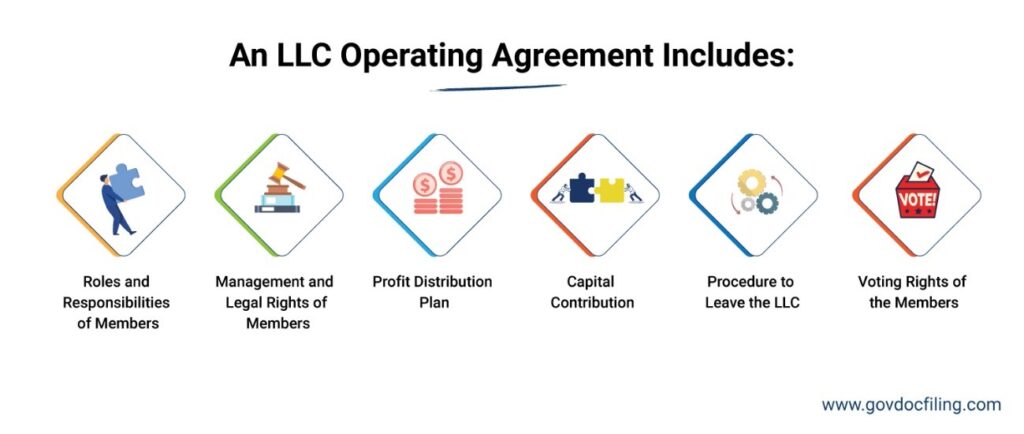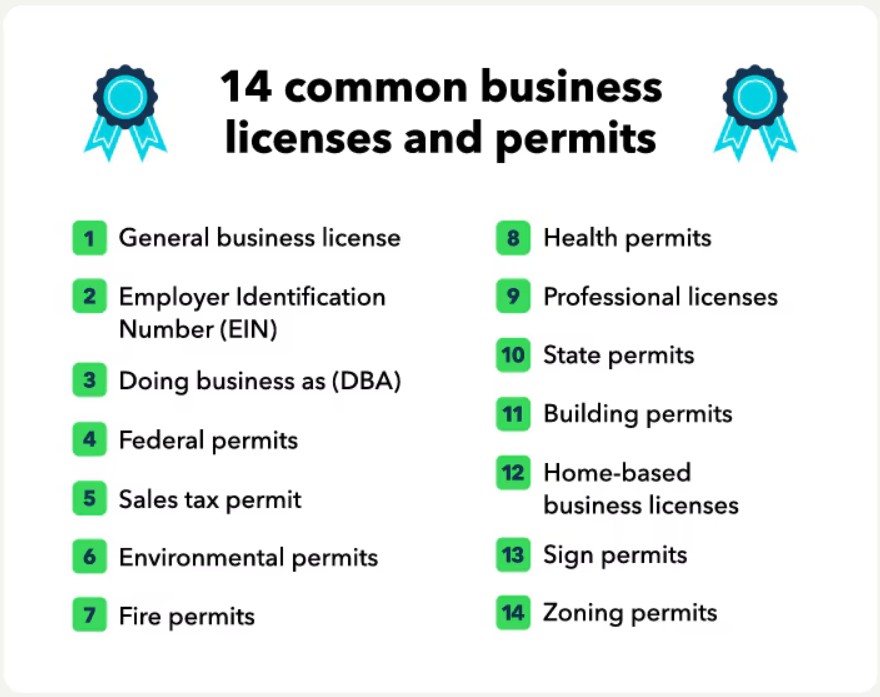Starting a business can be a thrilling yet unpredictable journey, but one of the key ways to stay on track is by selecting the right business structure from the start. Many small business owners opt for a Limited Liability Company (LLC) because this structure provides flexibility, and your personal assets are protected from business-related risks.
So, “What is an LLC?” and is it the right choice for you?
As one of the popular business structures, an LLC combines the best of both worlds. It offers the flexibility of a sole proprietorship or partnership with the liability protection typically associated with a corporation. However, it does come with certain requirements that set it apart from other business entities.
Whether you’re starting a new business or transitioning from another structure, understanding what an LLC is and how it operates compared to other entities will help you make informed business decisions.
In this guide, we’ll answer the question, “What is an LLC?” We’ll also cover how it works, its advantages, how to form one, and key legal and tax considerations.
What is an LLC?
A Limited Liability Company (LLC) is a business structure that combines the benefits of a corporation’s limited liability protection with the simplicity and tax advantages of a sole proprietorship or partnership.
While more formal than a sole proprietorship, an LLC requires less paperwork and fewer formalities than a traditional corporation
How else might one directly address the question, “What is an LLC?”
Another way to define an LLC is as a separate legal entity that protects its owners, known as members, from personal liability for company debts and obligations.
This means that members’ personal assets are protected from business-related lawsuits and creditor claims.
One of the most appealing aspects of an LLC’s structure is its flexibility in ownership and management. Unlike some other business entities, an LLC can be owned by:
- A single individual (single-member LLC)
- Multiple individuals (Multi-member LLC)
- Foreign entities (in most states)
- Corporations
- Other LLCs
- Trusts
Entrepreneurs can also own multiple LLCs simultaneously, making this structure ideal for managing multiple businesses or real estate investments.
The ownership stakes in an LLC are called “membership interests.” These can be transferred according to the terms outlined in the operating agreement.
What is an LLC from a tax perspective? LLCs enjoy “pass-through” taxation by default, meaning the business doesn’t pay federal income taxes.
Instead, the LLC’s profits and losses are reported on the individual members’ personal tax returns. However, LLC owners can elect to be taxed as a corporation if it offers financial advantages like lower tax rates or business deductions.
Types of LLCs
To further understand “What is an LLC,” it’s important to explore the various types available. LLCs come in different forms to suit a wide range of needs, ranging from ownership structure to specific operational purposes.
 Image via GovDocFiling
Image via GovDocFiling
These classifications are not mutually exclusive. An LLC can fall into multiple types depending on various factors. Let’s explore the most common types and some specialized variants.
Common LLC Classifications
LLCs can be grouped into basic classifications based on three main factors. These are based on ownership, management structure, and jurisdiction:
Based on Ownership Structure
- Single-Member LLCs: This business structure is simple. The business is owned by a single individual or legal entity. Single-member LLCs offer liability protection but are usually considered “disregarded entities” for tax purposes, similar to sole proprietorships. Solopreneurs and consultants often favor single-member LLCs.
- Multi-Member LLCs: Owned by two or more members, these LLCs are automatically treated as partnerships for tax purposes unless they elect otherwise. They require more comprehensive operating agreements to define ownership percentages, profit distribution, and decision-making processes.
Based on Management Structure
- Member-Managed LLCs: This is the default management structure in most states. Here, all owners (members) participate in daily operations and decision-making. This structure is ideal for small businesses where owners want to be actively involved in operations.
- Manager-Managed LLCs: In this structure, some members act as passive investors while appointed managers (who may or may not be members) handle daily operations. This structure is common in larger LLCs or when some owners prefer to be passive investors.
Based on Jurisdiction
- Domestic LLCs: A Domestic LLC operates in the state where it was formed and primarily conducts business. It’s the most common type of LLC, and it follows the regulations of the state in which it was registered.
- Foreign LLCs: These are LLCs formed in one state but are registered to do business in another state. For example, if you form an LLC in California and want to operate in Nevada, you must register as a foreign LLC in Nevada.
Also Read:
Specialized LLC Types
What is an LLC, and which types are classified as specialized? These types of LLCs cater to specialized needs or operational contexts:
- Professional LLC (PLLC): PLLCs are intended for licensed professionals, including architects, doctors, and lawyers. They’re subject to specific state regulations and often require members to hold professional licenses. Some states, like California, don’t allow PLLCs. Others, like New York, allow them, but require all members to be licensed in the same profession.
- Series LLC: This structure is unique, and it allows a parent LLC to have multiple, separate divisions (or series), each with its own assets, liabilities, members, and operations. This type of LLC is ideal for businesses with distinct lines of operations that require isolation of risks. While series LLCs are popular in real estate investing, they’re not available across all states.
- Low-Profit LLCs (L3Cs): This type of LLC is a hybrid between for-profit and nonprofit entities. L3Cs must primarily pursue charitable or educational purposes while still being allowed to generate modest profits. It merges the flexibility of an LLC with the social mission of a nonprofit, making it ideal for businesses prioritizing purpose over profit. L3Cs are not recognized in all states.
- Anonymous LLCs: Also known as “silent LLC” or “nominee LLCs.” These LLCs offer enhanced privacy by allowing owners to keep their identities off public records, making them useful for maintaining privacy and anonymity in business dealings. States like Delaware, Nevada, New Mexico, and Wyoming don’t require the disclosure of LLC member names in their public records.
- Restricted LLCs: Restricted LLCs are designed to be more secure and stable over time. They protect assets by restricting the distribution of profits to members for a specified period, usually until the LLC has existed for at least ten years. This makes them suitable for estate planning or long-term investment strategies. Restricted LLCs are mainly available in Nevada.
Knowing “What is an LLC” is not enough. Business owners need to understand the different types of LLCs to select which structure best suits their needs. Whether you’re looking for simplicity, specialized structures, or unique legal benefits, there’s likely an LLC type designed to meet your requirements.
Also Read:
Purpose and Benefits of Forming an LLC
Forming a Limited Liability Company (LLC) is a strategic decision for many business owners due to its distinct advantages and flexibility. Having already answered the question, “What is an LLC?”, let’s now explore why you should consider forming it.
Limited Liability Protection
One of the primary purposes of forming an LLC is to shield its owners, known as members, from personal liability for business debts and obligations.
In an LLC, the members’ personal assets, such as homes, cars, and personal savings, are generally protected from business-related lawsuits and creditors.
This limited liability protection is particularly crucial for entrepreneurs who want to take risks without jeopardizing their personal financial stability.
The protection remains intact as long as owners maintain proper separation between personal and business finances and follow corporate formalities.
Flexible Management Structure
A limited liability company offers remarkable flexibility in terms of management. Unlike corporations, which require a formal hierarchy with a board of directors and officers, LLCs allow members to choose between two management structures.
 Image via GovDocFiling
Image via GovDocFiling
- Member-Managed LLCs: Members handle the daily operations and decision-making. This is ideal for small businesses with hands-on owners.
- Manager-Managed LLCs: Members can designate managers to run the business, allowing passive members or investors to take a backseat.
In addition to choosing between member- and manager-managed LLC management styles, you can:
- Add or remove LLC members as per the operating agreement
- Tailor the voting rights and decision-making processes to business needs
- Distribute management responsibilities based on expertise rather than ownership stake
Enhanced Business Credibility
Operating as an LLC adds a level of professionalism and credibility to your business. Displaying “LLC” in your company name signals to customers, clients, and partners that your business is legally established and well-organized.
For small businesses or startups, forming an LLC can help build trust, especially when entering contracts or seeking partnerships. Additionally, banks, vendors, and investors often view LLCs more favorably than sole proprietorships.
Also Read:
Tax Advantages
What is an LLC, and what are the tax advantages? LLCs enjoy significant tax advantages, making them a preferred choice for many business owners.
LLCs benefit from pass-through taxation, unlike corporations, which face double taxation on profits at both the corporate level and when distributed as dividends.
Pass-through taxation allows a company to transfer its profits and losses directly to the personal tax returns of its members.
Another tax advantage of an LLC is that it has the flexibility to choose its tax classification. This allows them to be taxed as a sole proprietorship, partnership, S-Corporation, or C-Corporation, depending on what’s most advantageous for the business.
Simple Compliance Requirements
Compared to corporations, LLCs typically have fewer record-keeping and compliance requirements.
For instance, they usually need to file Articles of Organization and Annual Reports with the state and, in some cases, draft an operating agreement. However, they’re not required to:
- Hold annual meetings
- Maintain a board of directors
- File extensive reports
Business Continuity and Ownership Transfer
LLCs offer flexibility in transferring ownership interests. Members can sell or transfer their ownership stakes, subject to any restrictions outlined in the LLC’s operating agreement.
This flexibility makes it easier for members to exit the business or bring in new partners. Essentially, it ensures the business can continue operating smoothly during ownership transitions. The advantages of long-term business planning include:
- Membership interests can be transferred without dissolving the company
- Succession planning can be clearly outlined in the operating agreement
- Business sale or acquisition processes are typically smoother
- Ownership transitions can be structured gradually
Also Read:
- Sole Proprietorship vs LLC: Everything You Need to Know
- What Are the Differences Between a Partnership and an LLC?
How to Form an LLC: Step-by-Step Guide
Now that you know what is an LLC, let’s explore how to form one. Below is a step-by-step guide to forming an LLC and ensuring compliance with state regulations.
1. Choose a Business Name
Forming an LLC starts with choosing a unique business name that complies with state-specific naming rules. Most states require LLC names to include “Limited Liability Company” or an abbreviation like “LLC.”
 Image via GovDocFiling
Image via GovDocFiling
The name must avoid restricted words like “Bank” or “Insurance” unless special permissions are obtained. Before finalizing a legal name or Doing Business As (DBA) name, check its availability through your state’s business database.
Conducting a trademark search can also help verify if a name is available, helping you avoid legal disputes. Additionally, securing a domain name helps maintain a consistent online presence for your LLC.
2. Appoint a Registered Agent
Next, choose a registered agent to receive legal documents on your LLC’s behalf. Every state mandates LLCs to appoint a registered agent with a physical address in that state.
You can act as your own registered agent, appoint a business partner, or hire a professional service. Hiring a professional registered agent service ensures timely compliance, especially for businesses operating across multiple states.
Your registered agent ensures your business receives legal notices, business documents, and government correspondence promptly. Choosing a reliable registered agent is crucial to staying compliant with state laws.
3. File Articles of Organization
The next crucial step is filing Articles of Organization with your Secretary of State. The Articles of Organization are the official documents submitted to the state’s business filing office to establish your LLC.
These articles typically include essential details like your LLC’s name, registered agent, business address, and management structure.

Image via GovDocFiling
Filing fees and requirements vary by state, so check your state’s guidelines beforehand. You can typically file online, by mail, or in person.
Once approved, your LLC is legally recognized as a business entity. However, some states, including New York, Nevada, Arizona, and Nebraska, require publishing a notice of LLC formation in a local newspaper.
4. Create an Operating Agreement
While not required in all states, creating an operating agreement is highly recommended to outline business operations and ownership structure.
It defines ownership percentages, voting rights, profit distribution, and operational procedures. Having this agreement helps prevent disputes among members and clarifies decision-making processes.

Image via GovDocFiling
Even for single-member LLCs, an Operating Agreement strengthens legal protection. A well-drafted operating agreement can also help resolve court disputes. It’s a legal document that proves the LLC operates separately from personal finances.
The document can be customized to fit the specific needs of your business. Many online small business legal services offer templates to help you draft an operating agreement, but consulting an attorney can ensure it meets all legal requirements.
Also Read:
- Important Legal Requirements for Starting a Small Business
- How Many People Are Needed to Form an LLC?
5. Obtain an EIN (Employer Identification Number)
An Employer Identification Number (EIN) is like a Social Security Number for your business. The IRS issues this nine-digit number to identify your LLC for tax purposes.
You’ll need to obtain an EIN from the Internal Revenue Service (IRS) unless you’re a single-member LLC with no employees. But even if you don’t plan to hire employees, an EIN is typically required for opening a business bank account and filing taxes.
Applying for an EIN is free and can be done online through the IRS website. The EIN application process is straightforward and usually takes only a few minutes.
6. Obtain Necessary Business Licenses and Permits
What is an an LLC and how can you obtain business licences and permits for it? Depending on your industry and location, your LLC may need specific business licenses and permits.
These licenses can be required at the federal, state, or local level. Common examples include health permits, zoning permits, and sales tax permits.
 Image via GovDocFiling
Image via GovDocFiling
If you operate multiple LLCs or you conduct your business in multiple states, you might need to secure the permits required in each jurisdiction. Failure to obtain the necessary licenses can result in fines or business closure.
Check with your state’s business licensing office or local government to determine which permits apply to your LLC.
Some industries, such as cosmetics, food service, real estate, construction, or consulting, may have stricter requirements. Meanwhile, some types of freelance businesses may have less stringent licensing requirements.
Whichever business type you operate, you need to keep up with all required licenses to ensure legal operation.
7. Open a Business Bank Account
Once your LLC is officially registered, opening a business bank account is a crucial next step. A dedicated account keeps your personal and business finances separate, which is vital for maintaining liability protection.
With a business bank account, you can process payments, manage payrolls, and track expenses efficiently. Some banks also offer business credit cards and loan options that can help with future growth.
Many banks require an EIN number, Articles of Organization, and an Operating Agreement to open an account. Check around for banking options that offer low fees and business-friendly features.
8. Comply with Ongoing State Requirements
Forming an LLC is not a one-time process. You must comply with ongoing state requirements to maintain your business status.
Most states require LLCs to file an annual report that updates business details and pays renewal fees. Some states also impose franchise taxes or other periodic filings.
Keeping up with these requirements will help prevent penalties and keep your LLC in good standing.
Many states provide online portals to make annual tax filings easier. You can set reminders for renewal deadlines to ensure you don’t miss important filings.
Alternatively, outsourcing to a reliable business formation service can help track due dates and avoid late fees.
Also Read:
What Is an LLC Taxation All About?
Limited Liability Companies are flexible business structures, but their tax treatment varies based on their setup. The IRS does not recognize LLCs as separate tax entities. Instead, an LLC’s tax status depends on the number of members and the tax election it makes.
Default Taxation for Single-Member LLCs
What is an LLC’s default tax treatment when it has one owner? The IRS automatically treats a single-member LLC as a disregarded entity. This means it is taxed as a sole proprietorship.
The LLC itself does not pay federal taxes. Instead, the owner reports all business income and expenses on their personal tax return using Form 1040.
The key tax aspects of a single-member LLC include:
- Pass-Through Taxation: Profits and losses pass directly to the owner’s tax return. There is no separate business tax return
- Self-Employment Taxes: The owner pays 15.3% in self-employment tax on net earnings. This covers Social Security and Medicare
- Business Deductions: The owner can deduct business expenses, such as office costs, equipment, and travel, reducing taxable income
Default Taxation for Multi-Member LLCs
So, what is an LLC’s tax treatment if it has two or more members? By default, the IRS taxes it as a partnership. The LLC does not pay taxes directly. Instead, it files an informational tax return (Form 1065), and profits or losses flow to the members.
Key tax aspects of a multi-member LLC include:
- Pass-Through Taxation: Each member receives a Schedule K-1, reporting their share of profits or losses.
- Self-Employment Taxes: Members typically pay self-employment tax on their share of business income.
- Deductions and Credits: The LLC can deduct ordinary business expenses before distributing income to members.
Also Read:
Electing to Be Taxed as an S-Corp or C-Corp
An LLC can elect to be taxed as an S-Corporation (S-Corp) or a C-Corporation (C-Corp) by filing IRS Form 2553 (for S-Corp) or Form 8832 (for C-Corp). Why would an LLC make this election? It depends on tax benefits and business goals.
S-Corp Election
An LLC taxed as an S-Corp remains a pass-through entity, but with a twist. Owners who actively work in the business pay themselves a reasonable salary. The remaining profit is a distribution that is not subject to self-employment taxes.
Pros:
- Avoids double taxation
- Reduces self-employment tax on distributions
- Owners can still deduct business expenses
Cons:
- More IRS scrutiny on salary levels
- Additional payroll and tax filing requirements
- Not ideal for businesses with passive owners
C-Corp Election
If an LLC elects C-Corp taxation, it becomes a separate tax entity. The corporation pays taxes on its profits at the federal corporate tax rate (21%).
The owners (also known as shareholders) only pay tax on the income they receive from the corporation. This income is usually in the form of salaries (taxed as personal income) or dividends (taxed at capital gains rates).
C-Corp election can be beneficial for businesses planning to reinvest earnings or seeking outside investors.
Pros:
- C-Corps can issue multiple classes of stock and attract investors, including venture capitalists and institutional investors
- Stronger liability protection
- C-Corps can offer tax-deductible employee benefits such as health insurance and retirement plans
Cons:
- Double taxation as the company pays corporate taxes, and owners pay tax on dividends
- More administrative and filing requirements
- Less flexibility in profit distribution
Also Read:
FAQ
1. What is an LLC’s formation cost?
The cost of forming a Limited Liability Company (LLC) varies by state, with each having its own filing fees and requirements. Understanding what is an LLC’s formation cost helps businesses budget properly.
Generally, the cost includes:
- State Filing Fees: This is the primary expense. It ranges from $50 to $500, depending on the state.
- Registered Agent Fees: Some states require LLCs to have a registered agent, which may cost $100 to $300 per year.
- Operating Agreement Costs: While not always required, having one can help define ownership and management structure. Some businesses may hire an attorney to draft it, which adds to the cost.
- Business Licenses and Permits: Certain industries need licenses to operate. These costs depend on location and business type.
- Publication Fees: Some states, like New York and Arizona, require LLCs to publish a notice in newspapers, which can cost $200 to $2,000.
2. Can an LLC have only one owner?
Yes, a single-member LLC can have just one owner. Many small business owners choose this structure because it offers liability protection while being easy to manage.
A single-member LLC still provides legal separation between the owner and the business. This means personal assets are protected if the business faces lawsuits or debts. However, the IRS treats a single-member LLC as a disregarded entity for tax purposes, unless the owner elects to be taxed as an S-Corp or C-Corp.
Even if an LLC has only one owner, it must follow the rules set by the state to stay compliant. So knowing what is an LLC and its legal requirements can help owners make informed decisions.
3. Do LLCs protect personal assets from lawsuits?
One of the main reasons people choose an LLC is for personal asset protection. If the business gets sued, the owner’s personal savings, home, or car are usually protected.
However, this protection has limits. Courts may “pierce the corporate veil” if the owner does not keep business and personal finances separate. This can happen if:
- The owner mixes personal and business funds
- The LLC is used for fraudulent activities
- The company does not follow state regulations
To maintain protection, LLC owners should open a business bank account, keep accurate records, and comply with state laws.
4. How do LLC owners get paid?
LLC owners can pay themselves in different ways, depending on how their business is taxed:
- Single-Member LLCs: The owner takes draws from the business profits. These are not considered salaries but rather distributions of earnings.
- Multi-Member LLCs: Profits are divided among members according to their ownership percentage.
- LLCs Electing S-Corp Taxation: Owners can take a salary and additional profit distributions. This method can reduce self-employment taxes.
Owners must pay taxes on their earnings, whether through self-employment taxes or payroll taxes.
5. Can an LLC raise money from investors?
Yes, an LLC can raise money from investors, although the process differs from a corporation. LLCs don’t issue stock, so they attract investors through membership interests instead.
Here are some ways an LLC can raise funds:
- Adding New Members: The LLC can offer ownership percentages/stakes in exchange for investment.
- Loans: An LLC can take out business loans from banks, credit unions, or private lenders.
- Venture Capital and Private Equity: Though less common, some investors fund LLCs, especially if they convert to a corporation later.
- Crowdfunding: Different online platforms allow LLCs to raise money from the public, often in exchange for rewards or early access to products.
Also Read:
Conclusion
LLCs provide a balance of liability protection, tax flexibility, and operational ease, making them a popular business entity.
So, what is an LLC’s advantage over other business structures?
Compared to sole proprietorships, they offer stronger liability protection. They give you flexibility in terms of management and taxes, unlike corporations. When compared to partnerships, they provide stronger legal safeguards.
What is an LLC’s best use case? It works well for small to mid-sized businesses looking for liability protection without the complexity of a corporation.
Ready to form your LLC? Take advantage of streamlined LLC forms from online business incorporation services to make the process simpler and more efficient.
